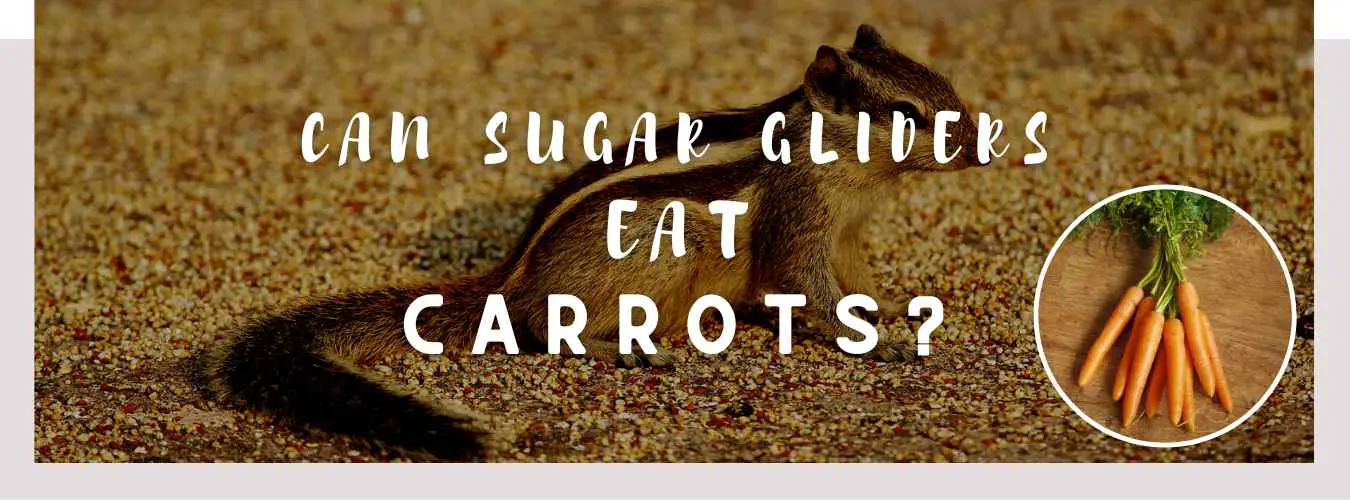
When it comes to the diet of sugar gliders, a common question among pet owners is: “Can sugar gliders eat carrots?” This article aims to provide a comprehensive answer to this query. Understanding the dietary needs and restrictions of sugar gliders is crucial for their health and well-being. We will explore the nutritional benefits, potential risks, and guidelines for feeding carrots to sugar gliders.
Carrots are known for their rich nutritional content, which includes vitamins, minerals, and fiber. They are particularly high in Vitamin A, essential for maintaining good vision, skin health, and immune function. For sugar gliders, these nutrients can be beneficial, but it’s important to understand how they fit into their overall diet.
Benefits of Carrots for Sugar Gliders
- Vitamin A for Eye Health: Carrots are an excellent source of Vitamin A, which is vital for maintaining healthy eyesight in sugar gliders.
- Dietary Fiber: The fiber in carrots can aid in digestion, helping to keep a sugar glider’s digestive system running smoothly.
- Low-Fat Snack: Carrots are low in fat, making them a healthy snack option for sugar gliders.
Potential Risks of Feeding Carrots to Sugar Gliders
While carrots can be a healthy addition to a sugar glider’s diet, there are some risks to consider:
- High Sugar Content: Carrots contain natural sugars, which, in excess, can lead to obesity or dental issues in sugar gliders.
- Choking Hazard: Small pieces of carrot can be a choking hazard. Always cut carrots into appropriate sizes.
- Imbalance in Diet: Overfeeding carrots can lead to nutritional imbalances. It’s important to maintain a varied diet.
Feeding Guidelines: Quantity and Frequency
Moderation is key when introducing carrots into a sugar glider’s diet. A small piece of carrot once or twice a week is sufficient. It’s important to observe how your sugar glider reacts to this new food and adjust accordingly.
You might also like: What Can Sugar Gliders Eat?

Incorporating Carrots into a Sugar Glider’s Diet
Here are some tips for safely adding carrots to your sugar glider’s diet:
- Start Small: Introduce carrots in small amounts to monitor for any adverse reactions.
- Proper Preparation: Wash and peel carrots to remove any pesticides or chemicals. Cut them into small, manageable pieces.
- Mix with Other Foods: Combine carrots with other fruits and vegetables to provide a balanced diet.
Understanding Carrots in a Sugar Glider’s Diet
Carrots, a common vegetable in human diets, can also be a nutritious addition to a sugar glider’s diet. However, understanding how to properly incorporate this vegetable is key to ensuring the health and happiness of your pet.
The Role of Carrots in a Balanced Sugar Glider Diet
While sugar gliders primarily thrive on a diet of nectar, fruits, and insects, vegetables like carrots can play a supportive role. Carrots should not be the mainstay of their diet but rather a supplementary item that adds variety and additional nutrients.
The Importance of Vitamin A
Carrots are famously rich in beta-carotene, a precursor to Vitamin A, which is crucial for sugar gliders. This vitamin plays a significant role in maintaining good vision, supporting a healthy immune system, and ensuring skin health. However, it’s important to note that excessive Vitamin A can lead to toxicity. Therefore, carrots should be given in moderation as part of a diverse diet.
Digestive Health and Fiber
The fiber in carrots is beneficial for a sugar glider’s digestive health. It helps in smooth bowel movements and prevents constipation, a common issue in captive sugar gliders. However, too much fiber can lead to digestive upset, so it’s important to balance the amount of carrot given.
Hydration and Carrots
Carrots, being high in water content, can also aid in keeping sugar gliders hydrated. This is particularly beneficial for sugar gliders who might not drink adequate water.
Carrots as a Training Tool
Carrots can also be used as a low-calorie treat for training purposes. Their sweet taste is often appealing to sugar gliders, making them an excellent tool for positive reinforcement during training sessions.
You might also like: Can Sugar Gliders Eat Watermelon?
Organic vs. Non-Organic Carrots

When choosing carrots for your sugar glider, opting for organic varieties can reduce the risk of pesticide exposure. If organic carrots are not available, thoroughly washing and peeling non-organic carrots is essential to remove any surface chemicals.
Allergic Reactions and Sensitivities
While rare, some sugar gliders may show allergic reactions or sensitivities to certain foods, including carrots. Signs to watch for include gastrointestinal upset, changes in stool, or skin reactions. If you notice any adverse effects after introducing carrots, it’s advisable to discontinue feeding them and consult a veterinarian.
The Role of Carrots in Weight Management
For sugar gliders that are overweight, carrots can be a beneficial snack due to their low-fat content. However, their natural sugars mean they should still be given in moderation to avoid contributing to weight gain.
Variety and Balance
It’s important to remember that no single food item can provide all the necessary nutrients for a sugar glider. Carrots should be part of a varied diet that includes a mix of fruits, vegetables, protein sources, and appropriate sugar glider-specific formulas.
Final Thoughts
In summary, carrots can be a healthy and beneficial addition to a sugar glider’s diet when given correctly. They provide essential nutrients like Vitamin A and fiber, can aid in hydration, and serve as a low-calorie treat. However, they should be fed in moderation and as part of a varied diet to avoid nutritional imbalances and health issues. Always monitor your sugar glider’s reaction to new foods and consult with a veterinarian for personalized dietary advice.










